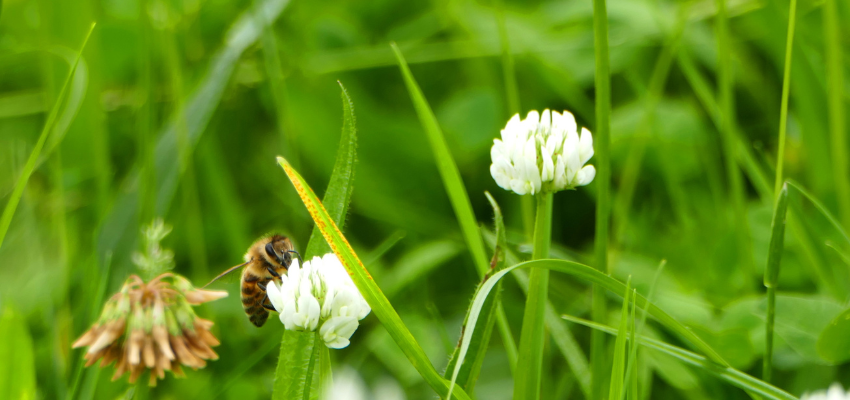First Certified Bee-Friendly Distillery in the U.S. Celebrates Pollinator Week!

At a time when pollinators (the birds, bats, bees, butterflies, beetles, and other small mammals that help sustain our ecosystem) are finally receiving the buzz they’re due, our farm share spirits partners at Far North Spirits have committed to an even higher level of support.
As one of only a handful of U.S.-based ‘estate distilleries,’ Far North Spirits’ owners, Mike Swanson and Cheri Reese, had already built one of the most sustainable distilleries in the country. Soon, Far North Spirits will receive the Bee-Friendly Farming Certification from Pollinator Partnership, making it the first distillery in the country to be recognized as such.
As an estate distillery (sometimes called a ‘farm distillery’), Far North Spirits grows its own grain and turns that grain into a finished product. It’s a business model that, to Swanson and Reese, produces a superior product that’s more eco-friendly (with a much smaller carbon footprint thanks to the raw materials needing little-to-no transportation to the distillery), but is also a business model that is especially susceptible to field conditions.
A fourth-generation farmer himself, Swanson knows that bees and other insects “provide billions and billions in ecological services” to support the nation’s growers. “If you’re a small farmer, you want your soil [and] your crops to be healthy, and you don’t want to spend a ton of money on fertilizer and chemicals unnecessarily.”
Still, even eco-conscious cultivators are suffering from the land-use practices of Americans nationwide – on farms, and in suburban yards. Years of pesticide use, a steady loss in habitat and food supply, as well as new and emerging diseases, have decimated the U.S. bee population since 2006. “The colony collapse disorder with the bee populations is a very pressing issue, and there’s so much more that can be done about that,” says Swanson.
Driven by the desire to have a greater impact, and inspired by bat-friendly growing practices employed by some agave farms in Jalisco, Mexico, earlier this year Swanson and Reese committed to certifying their business as bee-friendly.
It turns out that a lot of the practices in use at the Swanson farm for generations are also good for pollinators. “We were not a pesticide-intensive operation to begin with, which helps. We were also raising canola, which is a major honey-producing crop,” Swanson told me. (Fields just over the state border from Far North Spirits are so lush with canola that, improbably, North Dakota is the top honey-producing state in the country.)
An evolution of land-management customs is also necessary. As an example, Swanson mentions the practice of maintaining a margin of uncultivated land around fields (called ‘buffer strips’).
“[Farmers] complained and kicked up about the buffer strips years ago. They work [though], and there are guys that are finally starting to admit that around here.
“You can see the fields that have buffer strips on the edges – there’s no black dirt running into the ditch. They prevent erosion, and in those buffer strips are acres and acres of habitat for all these vital insects and birds.” Mike stresses that you don’t need to be a farmer, or even a landowner, to join the “bee squad” and help pollinators.
“There are basically 3 pillars of taking care of pollinators. One is to have the pollinating habitat, the actual flowers; two is the nesting – so some shrubs, some hedges; and three is a clean water source.” All are items that, even those with just a patio or balcony, can provide. And, to those who do have a lawn, Mike says “I think dandelions need better PR, but xeriscaped lawns are much more beneficial for a whole host of reasons than just acres of super-green grass.”
National Pollinator Week is from June 20-26, it’s a time to raise awareness about the critical role pollinators play in our ecosystem. To celebrate there are events planned and special releases at Far North Spirits in Hallock, and you’re invited; or take this week to do something to help pollinators thrive in your own neighborhood.
And, of course, for the next few weeks, in addition to featuring cocktail recipes in your weekly farm share made with Far North Spirits products, we’ll be featuring cocktail recipes made with honey, and/or Ida Graves Vodka, the Alexandria-based vodka distilled from raw honey.